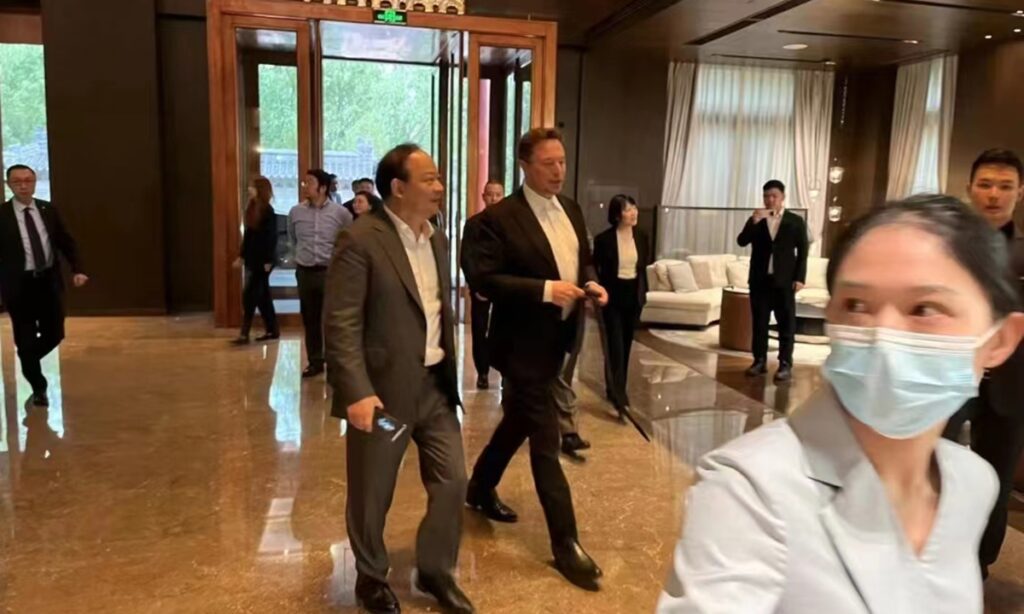When Tesla’s founder Elon Musk landed at a Beijing airport on Tuesday, his first visit to China in three years, he may have expected a hearty welcome from Chinese officials and employees at Tesla’s plant in Shanghai, but he may not have expected that his visit would have attracted such enormous attention among Chinese netizens that the details of his dinner menu were spreading fast on China’s social media platforms.
The 52-year-old South African-born US billionaire is among a string of global multinational executives to have visited China this year shortly after the country optimized its COVID-19 response and opened its arms to global travelers, a vivid reflection of overseas companies’ eagerness to deepen connections with the Chinese market amid global economic weakness.
According to a statement published on the website of the Ministry of Foreign Affairs on Tuesday, Foreign Minister Qin Gang met Musk in Beijing. During their meeting, Musk said Tesla objects to “decoupling” and is willing to further expand business in China. Chinese Commerce Minister Wang Wentao also met Musk on Wednesday.
After the meeting with Qin, Musk was said to have enjoyed dinner at a high-end restaurant in Beijing, according to photos circulating on China’s social media platforms. He was cordially received by the restaurant with a menu elaborately designed to contain the initial of Musk’s last name in Chinese and 16 dishes including geoduck with pickled cabbage and zhajiangmian, a traditional noodle dish topped with a rich soybean paste.
Musk’s visit was preceded by one in March by his mother Maye Musk, who, after enjoyed her two-week-long trip to China, tweeted that everyone is kind and friendly.
Apart from Musk, other US multinational executives have beaten a path to China’s door in recent days. JPMorgan Chase CEO Jamie Dimon made his first visit to China in about four years, during which he met with Shanghai Party chief Chen Jining on Tuesday and attended a two-day summit convened by JPMorgan.
The two-day summit attracted more than 2,600 participants from 37 countries and regions. Among them were some of the most influential investors in China and abroad, as well as representatives of companies whose market value totaled $4.5 trillion, including Starbucks and Pfizer.
According to a report by thepaper.cn, Dimon noted that the summit has attracted global investors to gather in Shanghai, which reflects confidence in Shanghai and China’s development. He noted that JP Morgan will continue to strengthen its business layout in Shanghai and better support Shanghai to construct an international financial center.
A statement sent by JPMorgan to the Global Times on Wednesday showed that JPMorgan China CEO Liang Zhiwen said that China’s adjustment of coronavirus control and management measures is one of the biggest catalysts for global economic development this year, and deeper understanding of the Chinese market is of unprecedented significance to global investors.
The frequent visits by overseas executives coincide with the steady pace of China’s opening-up, experts said, as China has launched a series of reforms in recent years to facilitate foreign investment in the Chinese market.
In particular, a lot of reform measures have been launched in an orderly manner to open up the domestic financial sector to overseas capital, ranging from opening a stock link program between the Chinese mainland and Hong Kong, to activating a mutual bond market access scheme between the two regions.
China’s securities regulator on May 26 allowed Morgan Stanley to set up a Chinese futures company in Beijing to implement the opening-up of the country’s futures market. The regulator disclosed in a statement that it plans to further deepen the opening-up of the futures market and support qualified overseas institutions to invest in domestic futures companies.
The recent policies show that the pace of China’s opening-up will only be quicker and the door will only open wider, which is conducive for China to attract foreign investment and the internationalization of the yuan, Hu Qimu, deputy secretary general of the digital real economies integration Forum 50, told the Global Times on Wednesday.
Hu expects that for the next step of China’s high-level opening-up, the approval cap of foreign capital will be further expanded, with its focus to guide foreign capital investing more in strategic emerging industries. The process of licensing will be reduced to improve the convenience of investment and reduce transaction costs, Hu added.
A survey conducted by the China Council for the Promotion of International Trade (CCPIT) recently showed that about 97 percent of the 600 foreign enterprises from 26 localities in China have expressed satisfaction with China’s policies concerning foreign investors since the fourth quarter of 2022, a vivid reflection of how overseas companies are attracted by China’s opening-up policies.
Confidence in China
The frequent visits made by overseas corporations to China showed US companies’ commitment to the Chinese market despite fluctuations in the two countries’ relations.
“It highlights that only through cooperation can countries and companies achieve win-win results, while decoupling leads nowhere,” Liang Haiming, dean of Hainan University’s Belt and Road Research Institute, told the Global Times on Wednesday.
According to Liang, the dividend in the Chinese market, in contrast to the deteriorating environment in the US with surging inflation, bank bankruptcies and the debt ceiling crisis, has made US businesses realize that they need to set their sights on China and strengthen cooperation with China if they want to develop.
Chen Jia, an independent research fellow on international strategy, said that the intensive visits made by global CEOs to China since the beginning of this year can be deemed as a powerful counterattack to US-led unilateralism and hegemonic thinking, when the US and its allies are mounting pressure on Chinese companies with their so-called de-risking strategy.
“The visits by multinational companies’ CEO to China to increase investment and consolidate supply chains are a full manifestation of China’s economic fundamentals and resilience, strong supply chains and high-quality labor force, which will be difficult to be replaced anywhere else across the globe,” Chen said. “This is the core reason why overseas companies are optimistic about China’s macroeconomy and why they make China an important part of their business strategy.”
(Global Times)




